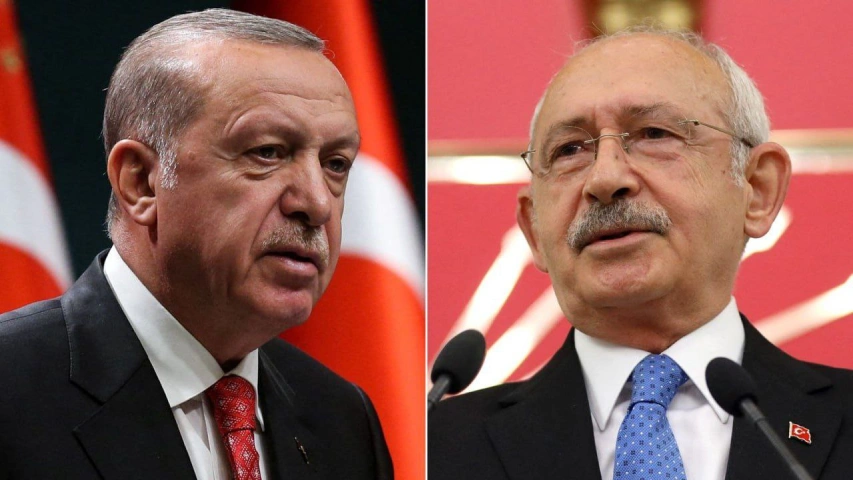

Turkish President Recep Tayyip Erdogan (left) and Kemal Kilicdaroglu are contesting elections that are too close to call
Turkey’s Islamist strongman Recep Tayyip Erdogan, who has won every election he ran, is, for the first time facing a stiff challenge at the presidential polls. The political ideology of Erdogan’s Justice and Development Party (AKP) – a clever blend of Islamism and Turkish nationalism – has declined as shown during the on-going polls, which have entered the run-off phase.
“Even if leading opposition candidate Kemal Kilicdaroglu wins only a couple of percentage points from Erdogan, it may be the beginning of the end for the maverick,” an Erdogan confidante admitted in an interview.
Resentment of Intellectual Conservatives
Ankara-based author Burak Bedil says Erdogan’s AKP has been targeting less educated, youthful Islamists, while adjusting more mature “intellectual conservatives,” but the party’s failure to deliver on economy and regional conflicts has rendered its religious rhetoric redundant.
Erdogan has been accused of weakening contemporary Turkey’s secular foundation, which has been in place since the country emerged from the ruins of the Ottoman Empire in 1923.
At the vanguard of opposition to Erdogan has been the urban, educated, intellectual and Sufi-oriented class of Turks.
Despite a barrage of punishing moves by the Erdogan government, the urban and intellectual Turks have shown exemplary resistance. They have been organising rallies in every major city of Turkey highlighting how Erdogan ventured out on a fake Islamist project and has isolated the country even in the Middle East.
Interestingly, Erdogan’s first 10-year rule was a promising model of openness and liberalisation. With the onset of the Arab Spring uprisings in the Middle East, it veered towards a political Islam model which is defined by narrow conservatism, aggressive neo-Ottoman nationalism and regional security tension.
Now, the AKP is returning to its liberal, not so Islamist model of politics.
Slipping Away of ‘Pious Generation’
Turkey is witnessing a flight from organised religion on the part of its younger generation. It frequently has been labelled — by themselves and by their critics — as “deism”. It points to an internal collapse of religiosity among the new generation of pious Turks.
The AKP’s “pious generation” seems to be slipping from its grasp. Deism and atheism were rejected and demonised as unnatural, foreign ideologies by the AKP. Ali Erbaş, the head of the Directorate of Religious Affairs (Diyanet), initially denied the turn of youth towards deism, then later, accepted its existence. AKP leaders also accept the emergence of a new and organic secularisation and the transition from a Cemaat (community)-centric religious culture to a politically administered one. The problem assumed such a proportion in recent months that the Diyanet had to launch a survey to investigate the existence and scope of deism and similar ideas in Turkish religious schools.
Volkan Ertit of Aksaray University in Turkey, who wrote an essay God Is Dying in Turkey as Well, found that the “top–down religiosity” imposed by the AKP government has not had the transformative effect that Erdogan envisioned. Ertit says a look at Turkey’s younger generations, for whom Twitter, Facebook, and Instagram are part of everyday life, reveals a very different society than the one envisioned and promoted by the state.
Pre-poll Stunts
On May 1, President Erdogan announced that the Turkish intelligence forces have killed Islamic State’s leader, Abu Hussein al-Qurashi, in Syria. The telecast of the President’s announcement was clearly aimed at boosting his ratings in the last leg of the presidential poll campaign. Al-Qurashi was stationed in a military post belonging to the Turkish-backed Ahrar al-Sharqiya mercenary group and was killed in Jindires, Afrin, according to a statement of the Syrian Democratic Forces, a US-backed primarily Kurdish fighting coalition in northern Syria. SDF also alleges that Turkey has been actively backing IS and hinted that the killing al-Qurashi is a state-managed stunt to influence public opinion.
In another such stunt, on April 26, Erdogan’s health crisis sparked several theories on social media that he had been poisoned after he cut short a television interview because of severe stomach ache. He, however, after three days, resumed his campaign and the authorities didn’t confirm his poisoning.
Erdogan’s Popularity Problem
Erdogan’s popularity problem stems largely from the ongoing economic crisis. Turkey’s annual inflation rate has soared above 80% and much of the electorate blames Erdogan. Whether dubious pre-election efforts to ensure an AKP victory will be enough to overcome Turkey’s widespread economic and financial distress remains, for the present, an open question.
Also Read: Will Erdogan’s faulty economic doctrine pull him down in next year’s elections in Turkey?
Minister for Electronics and Information Technology Ashwini Vaishnaw said on Friday that the government is…
Renowned human rights activist and political analyst Amjad Ayub Mirza has expressed a strong denunciation…
As was widely expected, the Indian economy grew by 6.5 per cent in real terms…
World No Tobacco Day, marked annually on 31 May, addresses a major public health challenge--the…
Defence Minister Rajnath Singh, addressing officers and sailors onboard India's first indigenous aircraft carrier INS…
The leadership team from the Central Tibetan Administration (CTA) arrived in Tokyo to participate in…